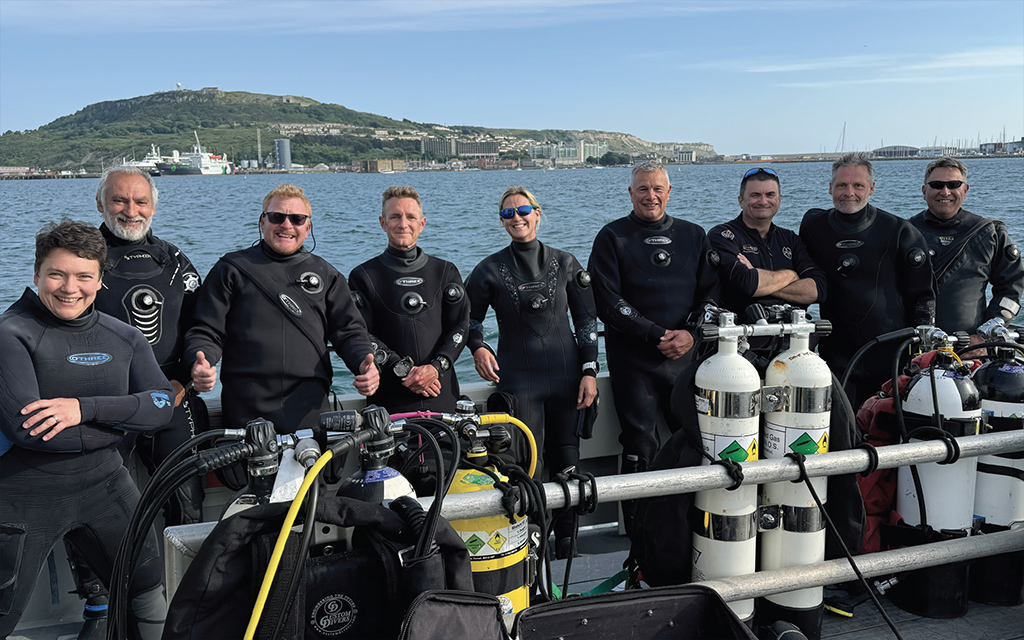
With a South Coast location and fantastic diving nearby, this medium-sized club is looking to encourage newer divers. Interview by Kristina Pedder.
When was Jurassic Divers formed?
The club was formed by Diving Officer David Collins, along with five of his old diving friends, who wanted to continue diving together. The club’s ethos is to “simply go diving...” and we became BSAC branch 2572 in 2017.
Seeing Jurassic in your name is a bit of a giveaway, but I’ll still ask where are you based?
Weymouth & Portland on the Jurassic coast is our home. We use the swimming pool at Osprey Leisure Centre in Castletown, Portland, and for lectures, training and planning sessions we have access to the classroom facilities at Jurassic Aqua Sports, a Weymouth-based BSAC Premier Seamanship Centre and dive charter business owned and run by David.
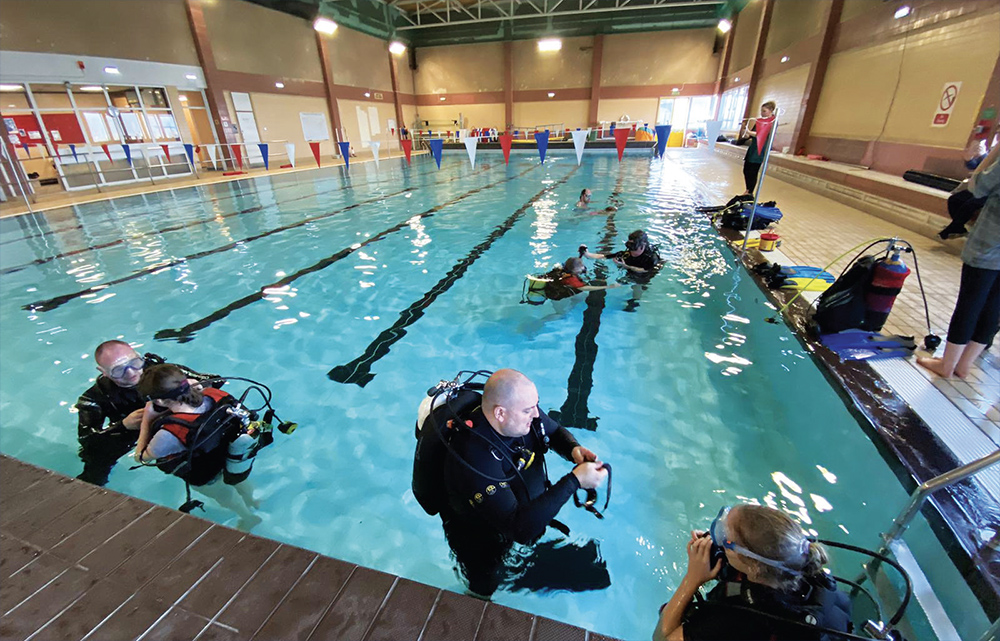
Pool training at Osprey Leisure Centre in Castletown, Portland
Who are your members?
We have a great mixture, old and young, from a wide area ranging from Exeter to Bournemouth, up to rural Somerset and across to Hampshire. They have one thing in common; a love of scuba diving and the underwater world.
How many members are there?
We have between 30 and 40 members, most of whom are qualified divers. We welcome members from any diving agency. Our focus is on evolving our younger members’ (over 18s) diving and snorkelling skills. We also have a social support network of family and friends. The range of good local pubs helps to support our social side.
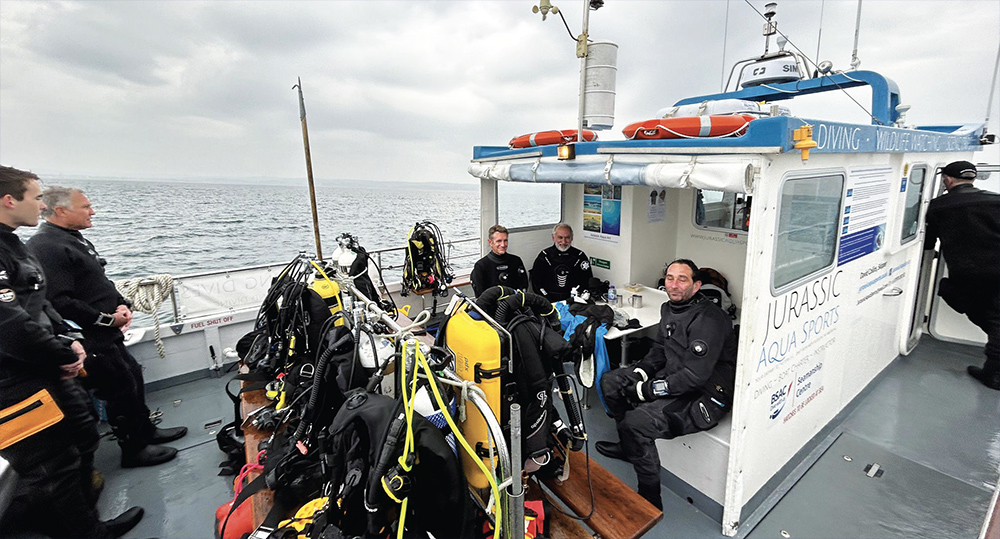
Aboard Waverider
Your membership fee is very reasonable, how do you manage financially?
The club doesn’t have any assets as we are very fortunate to use Jurassic Aqua Sports classroom and facilities for free; we also get discounted seamanship training offers (Jurassic Divers members only). We raise monies as we require them, rather than any regular fundraising. We have a culture of pay as you go and we keep our overheads to a minimum; they are mainly pool charges.
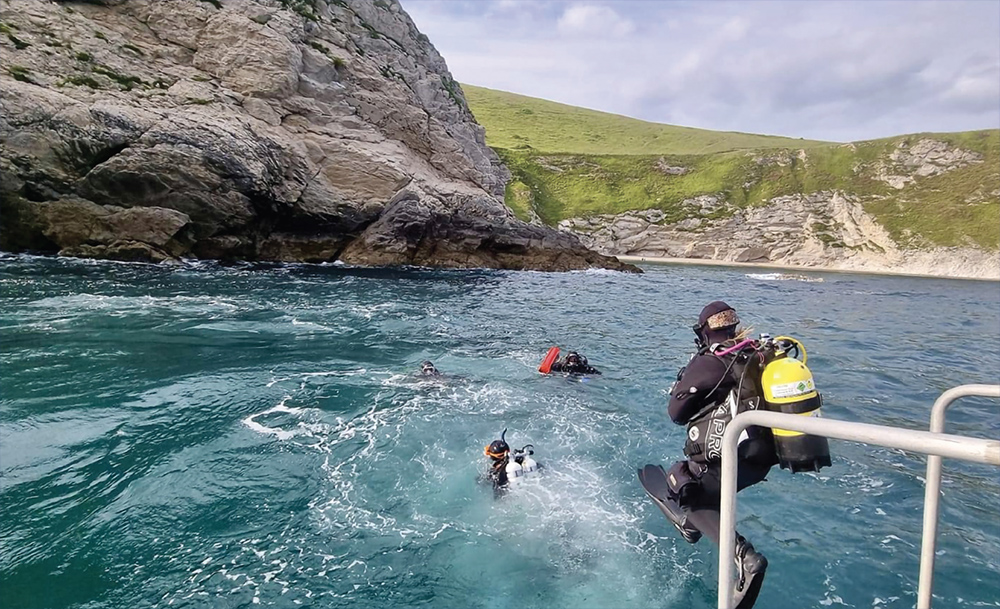
Entry at Bat's Head Reef
How is your diving arranged?
We have an annual planning session and publish a plan of club dives from March to October each year. On Wednesday nights, from April to end of September, we run hard boat dives using local dive boat Scimitar, when our Diving Officer (who is the skipper of Waverider Dive Charter) can have a night off to go diving. Club members pay around £25 to £35 for a place, depending on the distance travelled to the dive site. Guest divers are most welcome and simply pay a £5 surcharge. In 2024, we continued our Wednesday night dives way into October with night dives on at least four dive sites in Portland Harbour. We also arrange weekend dives; on charters, RIBs or from the shores of Chesil Beach and in Weymouth Bay. We venture further afield when members run trips to Porthkerris and West Bay a few times a year.
Oh, and there’s the Christmas Santa Dive, to be held on 14 December in 2025, to raise money for Weymouth RNLI lifeboat. It began in 2021 and in the past four years, along with the Easter Egg Hunt Dive, it has raised nearly £6,000. Jurassic Aqua Sports puts this on, and with only 12 spaces, club members can’t wait to book on.
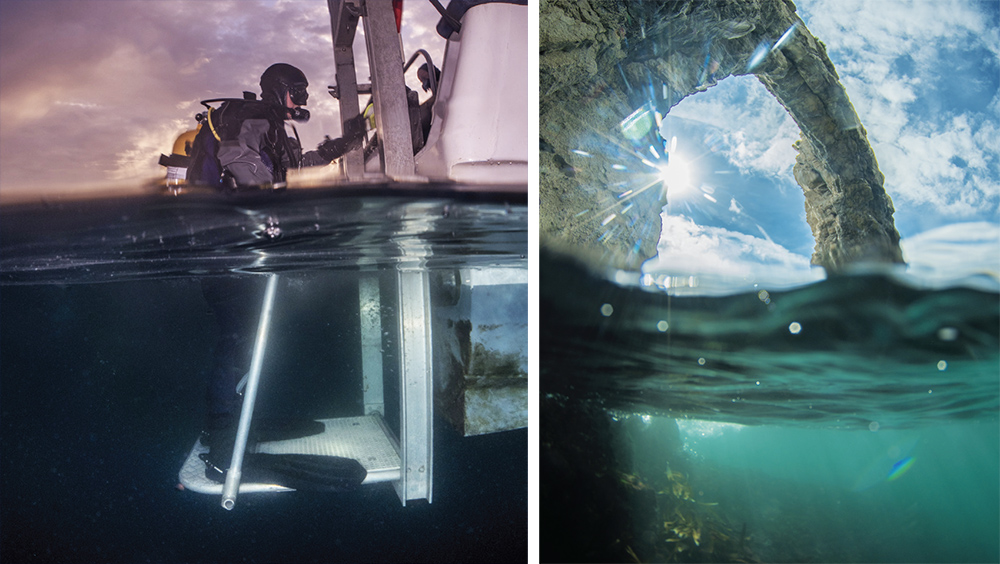
[L] Returning on the boat lift; [R] Durdle Door from below
So, what’s it like diving on the Jurassic coast?
It feels like the diving world is our oyster, centred as we are between Lyme Bay and Weymouth Bay on the Dorset coast. We are hugely blessed with our local diving. It is just superb, there’s nowhere better for diversity and variety of diving: wrecks, reefs, caves, ledges, cliffs and drop-offs, we have it all.

Chesil Beach shore diving
What sea life do you see?
We have an abundance of fish along the Jurassic Coast, especially on our wrecks where you will be greeted by live, moving curtains, before you see any wreckage. We see thousands of bib, shoals of pollock and whiting, and plenty of wrasse when diving on, for example, the Baygitano off Lyme Regis and the British Inventor on Lulworth Banks. That one is nicknamed ‘The Scallop Wreck’ by local divers, for obvious reasons.
Bat’s Head Reef, a dive site only discovered by our Diving Officer in 2020, has parallel deep-vee ledges where an underwater nursery has established. At other scenic sites such as Pulpit Rock and the Ariels, we are seeing the return of the crayfish, which was almost hunted to extinction in the late 1960s and 1970s. Pink fan coral and a wide range of nudibranchs can be found, even on well-dived local harbour wrecks such as the Countess of Erne.
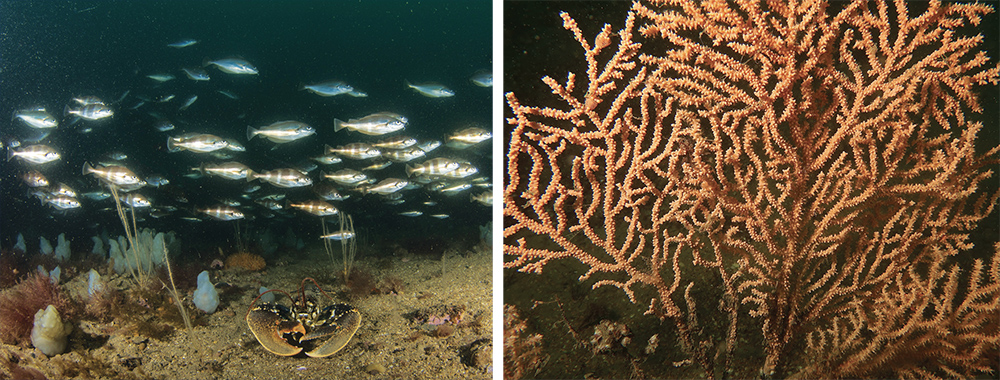
[L] Fish and lobster on the Baygitano; [R] Pink fan coral on the Saw Tooth Ledges
What about the shipwrecks?
It is estimated that 1,000 or more shipwrecks have taken place in these waters since the Elizabethan period. Our Diving Officer is a licensee for four historic protected wreck sites off the Dorset coast: HMT Arfon at 43m; HMS A3 Submarine, 39m; Chesil Beach Cannon Site, 10-15m; and West Bay Cannon Site, 12m. In September 2023, on a Wednesday evening club dive we were lucky to see the West Bay site. The depth here is just 12m, where our divers located the three cannons, one bronze and the two large admiralty anchors that lie on and around the site. We are running a club trip on 5 September this year and David is happy to run similar charter trips when Waverider is running out of West Bay (see the centre’s dive calendar JurassicAquaSports.co.uk). The Arfon and A3 sites are deep dives, which we haven’t dived as a club.
Do you do any diving with a purpose?
At the end of 2024, we linked in with a local team that has spent many years researching and surveying the 1805 wreck of the East Indiaman Earl of Abergavenny. We are aiming to work more closely with them during 2025.
In 2019, our Diving Officer started on a search for the lost and forgotten First World War wreck of the steam drifter HMD Golden Sunset. Built in 1913 in Lowestoft, she was hired by the Royal Navy as a patrol boat in 1915 and armed with a six-pounder gun. On 13 January 1918, while escorting a convey, she collided with Touraco off the Shambles Lightship and sank. The gun was recovered from the wreck by local divers in the 1970s, but the site details are lost.

[L-to-R]: Crystal jelly, West Bay; Limpets on kelp; Crab on the Adelaide, Chesil Beach
What’s your plan to find it?
We found an old Decca Lattice chart of the area to cross refence locations previously recorded. Then with a series of magnetometer surveys we located seven possible targets at a depth of 28m. In November, we discovered that there is no wreckage at the one named on the Admiralty chart, but instead there is a reef formed by two elongated pits, which initially resembled a wreck, but on closer inspection appears natural. The site is now renamed Sunset Reef. We will carry on, probably with the discovery of further reefs and boulder clusters, but that’s all part of the fun when wreck hunting.
What is the range of diving skills in the club?
The majority of our members are Sport Divers, PADI Advanced Open Water and Dive Leaders. We have a couple of Ocean Divers, an Advanced Instructor and a National Instructor too.
Is training popular with members?
Training will be our main focus in 2025. Having a hardcore membership of divers wanting to go diving has meant that the development of new members and the diver training programme side of our activities has become too lean.
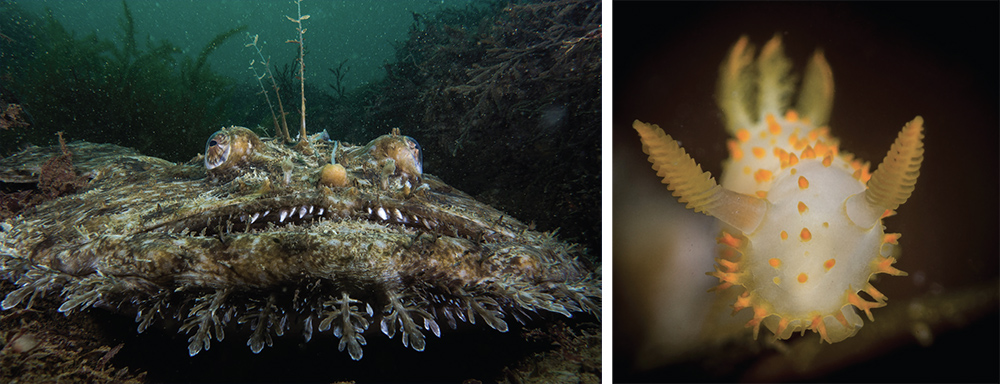
[L] Anglerfish at Bat's Head Reef; [R] Nudi on the Countess of Erne
How are you going to fix this?
We held a Try Dive event in February 2024 and have another scheduled for this year. A couple of our members are working towards instructor qualifications, so our training team will grow during the year. Of course, by working closely with Jurassic Aqua Sports, members can access all the seamanship-related qualifications, which can be hard to do when a branch doesn’t have a boat.
Are there any particular problems you encounter delivering diver training?
Access to a swimming pool is becoming more challenging year-on-year. With pools closing as local authority austerity kicks in, access to pool facilities is getting harder to arrange. We pool share with four other organisations on Tuesday nights. Booking ad hoc slots is more difficult due to the commercial use of the pool.

[L] Black Hawk bollards; [R] David Collins is licensed to dive the Cannon Historic Wreck in Lyme Bay
Anything else you’d like to tell SCUBA magazine readers about?
We must seem like a small club, dedicated to local diving, but we are looking to build and develop a strong team to support growing our club membership and increase our diving activities. We had a very constructive AGM and agreed a format to expand the club, so our members are definitely onboard.
Article ‘Club focus: Jurassic Divers’ by Kristina Pedder first published in SCUBA magazine, Issue 154 April 2025.
How do I find scuba diving near me?
If you want to learn to dive in Weymouth and Portland with Jurassic Divers, please contact David Collins.



